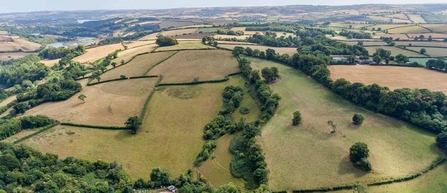Devon Wildlife Trust will begin creating Atlantic rainforest at a new nature reserve called Bowden Pillars Farm thanks to a long-term partnership with Aviva.
The 30-hectare (75 acre) site is located close to the market town of Totnes. Its position on the edges of the Dart river valley provides wonderful views of South Devon and Dartmoor. Devon Wildlife Trust has secured a 105-year lease which will allow it to plant two-thirds of the land with native species trees to create new rainforest.
The purchase of the lease has been made possible with support from Aviva, along with a generous legacy from a Devon Wildlife Trust supporter.
Rainforests of the British Isles have been largely destroyed over hundreds of years and now cover less than 1% of Britain. The restoration of this precious habitat is part of a wider programme of nature-based projects funded by Aviva to remove carbon from the atmosphere and to help nature recover.

